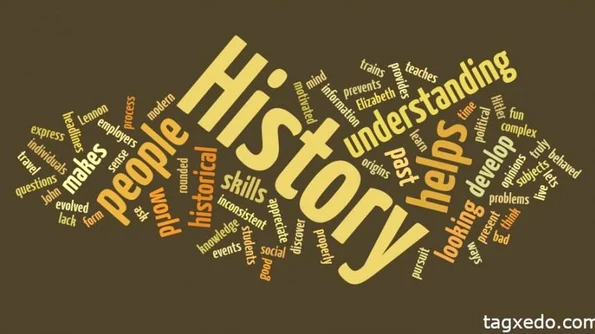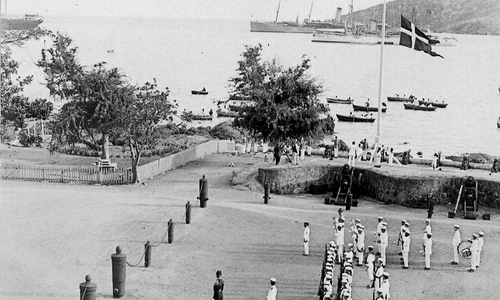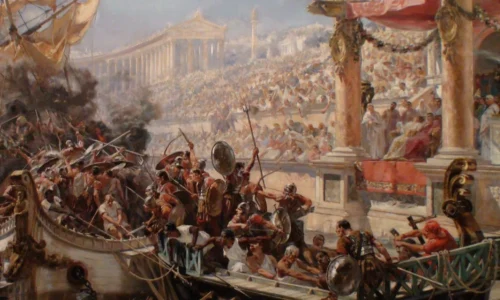
Why do we study history?
Why do we study history? Why do we go out on archaeological sites or delve into documents of by-gone ages? Why are you now on our site trying to read the articles you find the most appealing or interesting? Have you ever wondered?
Maybe you did, maybe you did not, but there was always something attractive about history. So much that people built institutes, faculties, universities, centres of studying it from the oldest of times. People have always been fascinated by what others before them did or said and especially by people in power:leaders. Power has been a constant attraction in humankind ever since it first appeared on Earth and it has been the organizing principle of the world. Regardless of the fact that power has different meaning to different cultures and civilizations, it usually defines a person or elite who has the ability to influence others and thus, to control in some ways, the events.

Take for instance what happened in July 1914. A group of people who wished for Bosnia to be an independent state decided to assassinate the Archduke Franz Ferdinand who maybe might have given them what they wanted, had they waited for him to become Kaiser. So, Gavrilo Princip (member of the Black Hand organization) shot the Archduke and the Dual Monarchy of Austria Hungary was left without an heir to the throne and with an aging Franz Joseph who was Kaiser since the Revolution of 1848. Thus, you could say that a group of people decided that a hereditary monarchy should lose its only heir which was an attack on the very existence of the state and it was perceived as such.
So, what a few people did was to actually create in Vienna the impression that the empire was in danger and the people closer to the Emperor, the government, decided to present Serbia with an ultimatum, since it was assumed that Belgrade aided its Bosnian nationals. When Serbia accepted it with the exception of Austro-Hungarian police participating in the investigation, Vienna declared war. Actually, a few people in Vienna decided that their country was at war with Serbia. Although they received the unconditional support of the Germans, at the last minute, Kaiser Wilhelm was reluctant to give its military support to a war between Belgrade and Vienna. In the end, he and his handful of ministers had to decide to mobilize the army to aid their ally.
In the case of Imperial Russia, the decision was even more reduced to the Tsar and his prime minister. Where am I getting with this, you wonder? And you would be right to ask such a question. What I wanted to point out is that a few people in power decided that their countries should be at war and thus, the armies should mobilize and people should die, in order to prove that their ideas were right and the others’ were wrong. So, in the end, wars start in the minds of the people, they take shape there before they are translated into strategies, tactics and arms races.
Indeed, people were and are very much fascinated by the idea of power. They study the decisions the leaders made in times of crisis and how the decisional units shrink in size whenever this happens and only people in the highest of places get to have a say. Time and again, it is proven that having power to influence events and decisions is attractive to whomever writes about history. Historians look into the past of those who are leaders, where they grew up, if they went to study at the university or not, to which culture/religion etc they belong to. Some even try to create a psychological profile of those people, if they have access to books/documents/recordings or any such material that would give one the possibility to make an educated guess about what their character and temperament are. That’s why we can find so many biographies of Hitler, Stalin, Roosevelt and so on. Because they have the effect of a magnet over people.
Also, the powerful elite may make the historian write influenced by certain principles which belong to the official ideology of the regime. Therefore, history books from the USSR, for instance, will be written with a Marxist – Leninist approach to the world:inevitably, there will be a war between capitalist states and inevitably, Moscow will extend the Bolshevik revolution to the Atlantic. Everything in history will fulfil a certain objective and will go towards it no matter what happens and that objective is to get to the moment when the state will dissolve itself and people will live happily and freely. Nevertheless, one does not have to be a specialist to realize that it is only an artificial principle invented to support the propaganda of a totalitarian regime.

Therefore, one would say that history is written by those who are in power or as you all may know the saying, by the winners. And this may or may not be true, yet, this is one of the reasons why we study history:to feel and to be only for a fleeting minute in the places of those who decide, who rule the world, who have it in their power to do anything.
You may say it isn’t so and may be right in your assessment, yet, we are enthralled to imagine how others lived and what we’d do in their place, because history is about humans, women and men just like us who may or may not have done something great. However, they lived in another time and space and we are all fascinated by how our lives might have unfolded, had we been there. But until the time machine is invented, we have history books, documents, archaeological sites, inscriptions, journals and memoirs. And that is why we love and study history!















